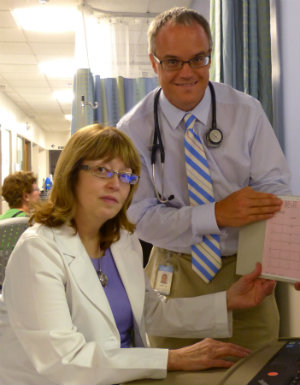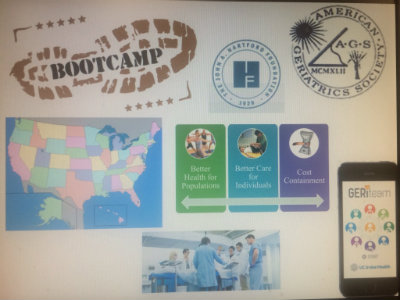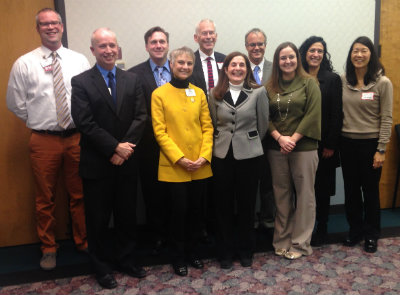 One of this blog's authors, Dr. Kevin Biese, right, and Dr. Jan Busby-Whitehead lead a collaborative project at UNC-Chapel Hill to develop a unique model of a geriatric emergency department (ED) focused on improving care transitions.
One of this blog's authors, Dr. Kevin Biese, right, and Dr. Jan Busby-Whitehead lead a collaborative project at UNC-Chapel Hill to develop a unique model of a geriatric emergency department (ED) focused on improving care transitions.Editor’s Note: This is the first of two parts.
“Geriatric Emergency Medicine”—As health professionals in Emergency Medicine (EM) who have chosen to focus on the geriatric population, we wish we could claim the topic brings a sense of excitement and opportunity to EM physicians worldwide.
It doesn’t.
Few EM physicians enter the specialty to focus on the clinically complex, often sub-acute or chronic health care needs of older adults. Dramatic made-for-TV helicopter rescues and airway management are what the average adrenaline-driven emergency physician loves.
And yet, in an aging society that is placing unsustainable demands on our Medicare system, few areas of enhanced care and emphasis are more needed in the “House of Medicine” than high-quality geriatric emergency department care.
Fortunately, the John A. Hartford Foundation is funding a team of EM physicians, nurses, geriatricians, and leading specialty societies to change the way care is delivered to older adults. Through the American Geriatrics Society (AGS), and in partnership with the Society for Academic Emergency Medicine (SAEM) and American College of Emergency Physicians (ACEP), the Hartford Foundation has supported the piloting of a new concept in transforming emergency care: The Geriatric EM Boot Camp.
 A poster from the Aurora Health Care-sponsored Boot Camp in Milwaukee.
A poster from the Aurora Health Care-sponsored Boot Camp in Milwaukee.Designed to disseminate the evidence-based Geriatric Emergency Department (ED) Guidelines, the boot camp is an interdisciplinary, on-site catalyst for system change. With support from Aurora Health Care and UPMC Health Systems, the first two boot camps occurred in Milwaukee and Pittsburgh, respectively, in December 2014 and January 2015. The Aurora boot camp was attended by 40 participants from three eastern Wisconsin hospitals ranging from ED physicians and nurses to case management, geriatricians, hospitalists, home health, and hospital administration.
All three Aurora hospitals selected quality improvement (QI) projects focused on ED triage nurse risk-stratification of older adults and referral to outpatient resources available through home health programs, the Aging and Disability Resource Center, and other community resources.
The UPMC Boot Camp was attended by 35 wide-ranging participants from three western Pennsylvania hospitals. Their hospitals selected a structured triage nurse-emergency physician delirium screening intervention QI project. The projects are truly Linking Education to Practice.
 The Aurora Health Care and EM leadership team at the Milwaukee Boot Camp..
The Aurora Health Care and EM leadership team at the Milwaukee Boot Camp..In late January, the Hartford Foundation invited Geriatric EM experts and facilitators of the Geri EM Boot Camp to the foundation offices for a day-and-a-half meeting to discuss new opportunities that may transform acute care of older adults. Participants included EM physician educators, researchers, guideline developers, and clinicians; geriatricians; health care financial experts; Emergency Nursing Association leadership; and key representatives from ACEP, SAEM, and AGS.
The urgency of the cause is great. In a post to follow next week, we will discuss the many challenges to providing optimal ED care for older adults.
But in this meeting, the excitement at being empowered to address the manifest needs was palpable. All of these groups were united in the desire to transform the care that older adults receive in the ED.
All attendees recognized this is an opportune time for action. The passage of the Affordable Care Act, and the resulting emphasis on value, make this transformation sustainable. And the need could not be more clear.
Improving Geriatric Emergency Medicine has been a recurring topic on,Health AGEnda. Previous posts include:
New Guidelines Show What a Geriatric Emergency Department Should Look Like
Can EMTs Improve Outcomes for Older Adults Leaving ER?
Collaboration Across Departments and Foundations Leads to Improved Emergency Care
